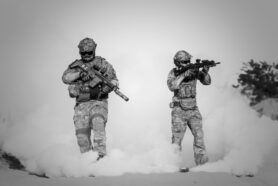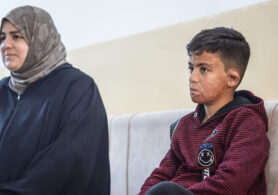Remote warfare involves combining (drone) strikes, while special operation forces train and advise local partners on to fight on the front line against groups like IS and Boko Haram. Emily Knowles (Director of the former Remote Warfare Program at the Oxford Research Group) and Dr. Jahara Matisek (Major in the US Air Force and an Assistant Professor in the Department of Military and Strategic Studies at the US Air Force Academy) discuss Western security force assistance (SFA) in so called ‘weak or fragile states’ in their research article published in 2019.
In weak states, SFA providers face the difficult task of trying to build effective and legitimate security forces while state institutions are fragmented and there is a general lack of basic safety and security. Therefore, making SFA efforts stick in weak states poses major challenges. According to Knowles and Dr. Matisek, traditional SFA approaches are too technical to deal with political problems in weak states. While SFA efforts may be aimed at building effective security, Western advisors have a flawed vision where approaches are rarely rooted in the reality of local partners’ capability, capacity, and legitimacy.
SFA strategies often fail in the long term because of the nature of weak state civil-military relations (CMR) according to the authors. SFA can strengthen parts of a fragmented system that may not serve the population or the stability of the state. Local partners gain privileged control over parts of the economy, military, and government. This level of power can lead to civil harm like detaining civilian, torturing prisoners, and executing civilians.
Fragmentation, corruption, and normalization of violence shape how local security forces behave towards civilians. Knowles and Dr. Matisek suggest a new vision for SFA is needed that is more adequate to meet the challenges of how politics and violence are intertwined and exercised in weak states.
They suggest a peacebuilding tool where there is less emphasis on developing military power and more emphasis on facilitating and improving relations between the different factions within the security sector and between the security sector and the civilian population. Local ownership has become one of the key elements of peacebuilding approaches. Using a peacebuilding approach would acknowledge local agency and would reduce the current tendency for SFA recipients to use international programs to boost equipment, training, and prestige for little return in improved International Humanitarian Law or CMR. If Western SFA personnel can avoid trying to create local security structures like the ones they have in the West and can spend time on improving relationships across and around the security sector, this would reduce many of the current pitfalls of SFA according to Knowles and Dr. Matisek.
Read the full article by clicking on the citation below.
This post was written by IRW LAB student Cemre Açikgöz.



